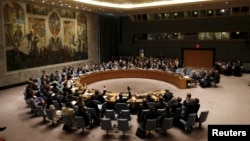U.N. member states elected five countries to two-year terms on the Security Council Thursday. Japan, Egypt, Ukraine, Senegal and Uruguay will join the U.N.’s most powerful organ on January 1, 2016.
The vote in the U.N. General Assembly garnered little excitement, as regional groups had already decided among themselves which countries to put up as their candidates and there was no competition for the five seats.
But each country still required a two-thirds majority of voting member states. All five countries far exceeded the required number and received strong support.
Council dynamics
Richard Gowan of Columbia University said Egypt’s presence on the 15-member council might upset traditional alliances. “Egypt’s position on the council will be intriguing, because it is traditionally an ally of the United States, but it has recently developed strong links with Russia.”
For Egypt, he added, the single biggest crisis of concern is Libya and the question of whether a U.N. peacekeeping force might be needed there.
After the vote, Egyptian Foreign Minister Sameh Shoukry told reporters that Cairo supports efforts of U.N. mediator Bernardino Leon and hopes the agreement he has been negotiating with the Libyan parties will be endorsed and implemented soon.
The council dynamic may also be affected by Ukraine’s election to the Eastern European seat in the midst of its conflict with permanent council member Russia.
Ukrainian Foreign Minister Pavlo Klimkin told reporters earlier this week that their relationship would “definitely not [be] conciliatory,” but that Ukraine would follow a “comprehensive and global agenda” comprising many issues in the council.
Russia annexed the Crimean region of Ukraine last year and continues to support pro-Russian rebels fighting in the country’s east. The U.N. says nearly 8,000 people have been killed since the conflict erupted in mid-April 2014.
“Russia needs to show it's willing to behave toward Ukraine in a civilized fashion,” Gowan said. “And allowing Kyiv to have a seat on the Security Council is a low-cost way for Moscow to do that.”
Filling the Asia-Pacific group seat, Japan joins the council for an unprecedented eleventh term. It last served from 2009-2010.
Long-time U.N. observer Jeffrey Laurenti says Japan “bludgeoned” Bangladesh within the regional group to deter it from competing for the seat. “Undoubtedly, Prime Minister [Shinzo] Abe sees this as part of his larger strategy to make Japan a bigger player on the global scene, and militarily he may be moving to try to have the Japanese contributing more forces to U.N. peacekeeping as a sugar-coated way to raise the profile of a military in Japanese society.”
Japan’s U.N. Ambassador Motohide Yoshikawa confirmed that his country plans to participate more in peacekeeping. “Our focus is also on how to enhance the capacity of peacekeepers, especially in Africa.”
He noted that Japan has been working with the U.N. since last year to establish a training facility for peacekeepers in Kenya and hopes it will be fully functional by 2016.
Senegal and Uruguay are both top troop and police contributors to U.N. peacekeeping missions, but some analysts agree they are unlikely to have a big impact on council business.
Permanent five
The bottom line, says Laurenti, is that the importance of the 10 elected council members has diminished. “The permanent five, even more than traditionally, have become the central drivers of anything done in the Security Council.”
Gowan agrees. “The reality is that right now, only three countries matter in the Security Council – and they are America, China and Russia,” he said.
The newly elected council members will replace Chad, Chile, Jordan, Lithuania and Nigeria, who complete their terms on December 31.
The new council members will begin their terms on January first. They will join the five permanent council members — China, France, Russia, Britain and the United States — and five other non-permanent members — Angola, Malaysia, New Zealand, Spain and Venezuela.












